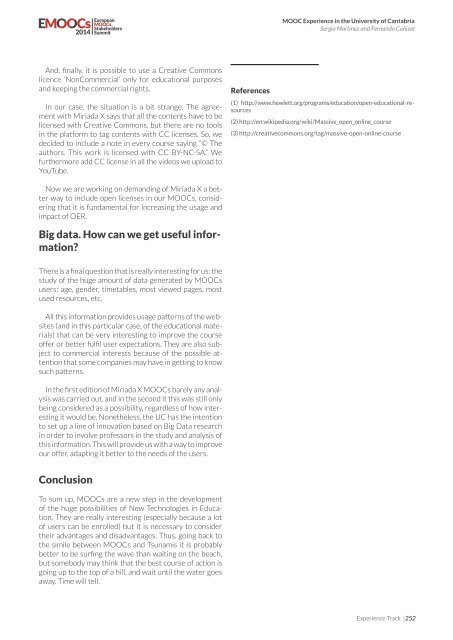zmWmQs
zmWmQs
zmWmQs
Create successful ePaper yourself
Turn your PDF publications into a flip-book with our unique Google optimized e-Paper software.
MOOC Experience in the University of Cantabria<br />
Sergio Martinez and Fernando Cañizal<br />
And, finally, it is possible to use a Creative Commons<br />
licence ‘NonCommercial’ only for educational purposes<br />
and keeping the commercial rights.<br />
In our case, the situation is a bit strange. The agreement<br />
with Miriada X says that all the contents have to be<br />
licensed with Creative Commons, but there are no tools<br />
in the platform to tag contents with CC licenses. So, we<br />
decided to include a note in every course saying “© The<br />
authors. This work is licensed with CC BY-NC-SA.” We<br />
furthermore add CC license in all the videos we upload to<br />
YouTube.<br />
References<br />
(1) http://www.hewlett.org/programs/education/open-educational-resources<br />
(2) http://en.wikipedia.org/wiki/Massive_open_online_course<br />
(3) http://creativecommons.org/tag/massive-open-online-course<br />
Now we are working on demanding of Miríada X a better<br />
way to include open licenses in our MOOCs, considering<br />
that it is fundamental for increasing the usage and<br />
impact of OER.<br />
Big data. How can we get useful information<br />
There is a final question that is really interesting for us: the<br />
study of the huge amount of data generated by MOOCs<br />
users: age, gender, timetables, most viewed pages, most<br />
used resources, etc.<br />
All this information provides usage patterns of the websites<br />
(and in this particular case, of the educational materials)<br />
that can be very interesting to improve the course<br />
offer or better fulfil user expectations. They are also subject<br />
to commercial interests because of the possible attention<br />
that some companies may have in getting to know<br />
such patterns.<br />
In the first edition of Miriada X MOOCs barely any analysis<br />
was carried out, and in the second it this was still only<br />
being considered as a possibility, regardless of how interesting<br />
it would be. Nonetheless, the UC has the intention<br />
to set up a line of innovation based on Big Data research<br />
in order to involve professors in the study and analysis of<br />
this information. This will provide us with a way to improve<br />
our offer, adapting it better to the needs of the users.<br />
Conclusion<br />
To sum up, MOOCs are a new step in the development<br />
of the huge possibilities of New Technologies in Education.<br />
They are really interesting (especially because a lot<br />
of users can be enrolled) but it is necessary to consider<br />
their advantages and disadvantages. Thus, going back to<br />
the simile between MOOCs and Tsunamis it is probably<br />
better to be surfing the wave than waiting on the beach,<br />
but somebody may think that the best course of action is<br />
going up to the top of a hill, and wait until the water goes<br />
away. Time will tell.<br />
Experience Track |252


